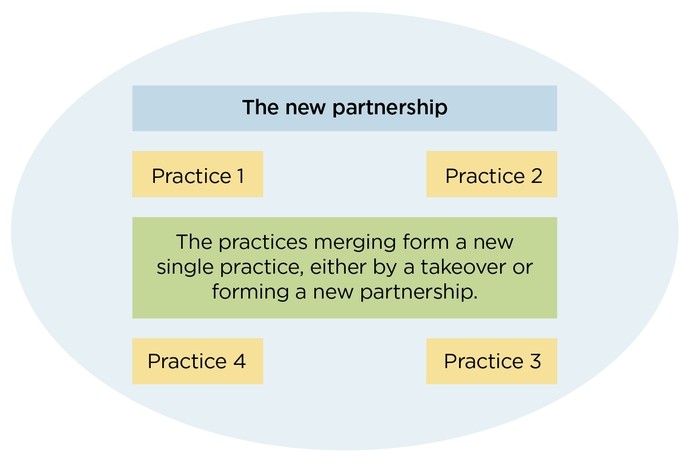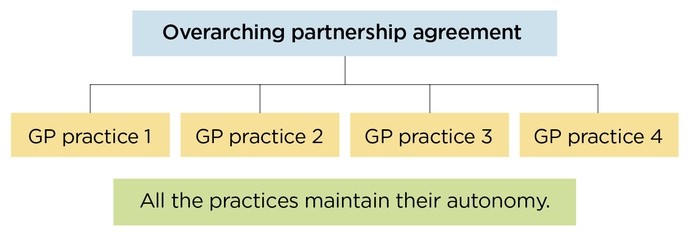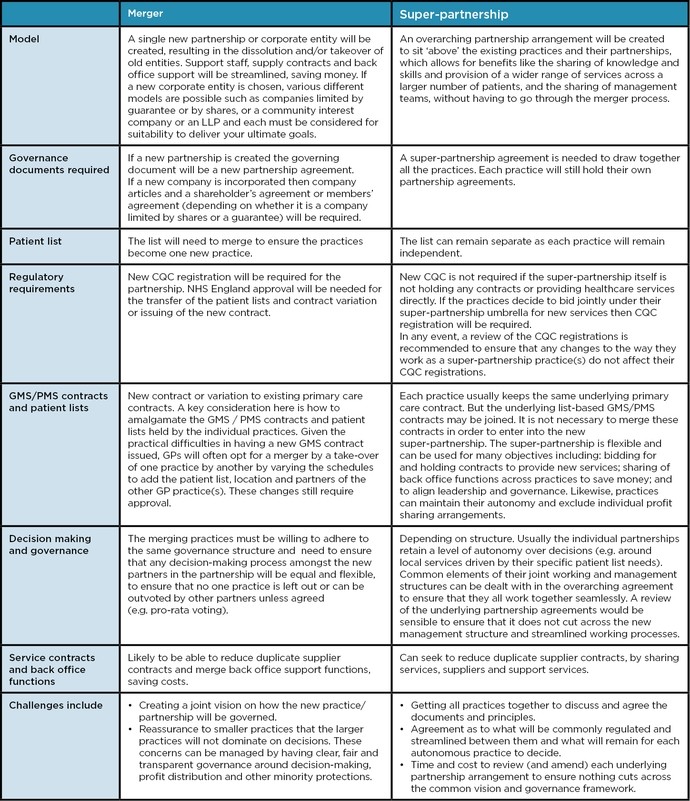Part three: Collaborating – what works best for you?

Details
Merger or super-partnership?
In part one and part two of our series ‘Collaborating – what works best for you?’ we look at the current pressures on the NHS, the policy direction, and move towards delivering integrated care, closer to home, and led by primary care at scale, as well as what it means for GPs to federate – or work together - in collaborations.
To recap, the move towards integration as a part-solution to the financial and quality pressures on the health service is placing additional onus on primary care and general practice. Following the ‘Five Year Forward View’ and the development of accountable care models, the expectation is now for entire localities of GP practices to collaborate to deliver primary care at scale around a place/population.
One of the ways GP collaborations are working together is to lead primary care home/primary care network configurations which aim to redesign primary care delivery (including the integration with community care services) around a registered patient footprint of 30,000-50,000.
Two of the models which we have seen implemented to introduce primary care at scale are GP mergers and super-partnerships which are the focus of this article.
What’s the difference between a merger and a super-partnership?
A merger is when two or more practices come together to form a new single practice. This can happen by either the practices merging together or, by one practice taking over the other practice. The original partnerships will no longer exist in their current form, or will dissolve. The vision as a single, larger practice will include a desire to grow by increasing the patient list, income potential and specialities offered to patients. It will enable greater investment in equipment, and back office sharing. The practices should have clear written shared aspirations and objectives.
Merger structure

A super-partnership is when separate practices collaborate with each other under the umbrella of a single ‘super-partnership agreement’ but they do not become one practice or lose their identity as autonomous individual practices. This is driven by a need to maintain autonomy of individual partnerships but a wish to share, for example, skills and specialities, and benefit from cost savings.
Super- partnership structure

Key considerations for choosing a merger or super-partnership:

Whether going for a merger or super-partnership, the ingredients for success for practices include:
- Ensuring all stakeholders have ‘bought in’ to the collaboration route, by engaging with all involved at an early stage. This is assisted by a clear statement of the benefits and improvements that can be achieved through the proposed collaboration. Capture these in a case for change and a benefits case
- A good understanding of the business of each organisation involved in the merger or super-partnership, which will be underpinned by a robust due diligence process to consider risks and synergies
- A clear plan for mitigation of risks and enhancement of synergies e.g. will you be reducing duplicate back office costs? There will be a requirement to review which contracts are duplicated and could be terminated and obviously consider whether staff redundancies will occur and if so, engage with the staff during the early stages of the process
- A clear timeline as well as a map of processes and tasks needed to reach the end point, which will help with understanding the journey and buy in of the practices
- Early agreement on the composition of any new board and management structures and clarity on their remit
- Engage the right support from the start which will include finance and legal assistance
- Ensure the right resource is in place to drive the project forward – appoint a project manager to take ownership and get the plan over the line
- Have a clear understanding on costs and an agreement on how they will be shared
Primary care collaborations, whether through mergers, super-partnerships, joint ventures or otherwise, not only bring the benefits of working together with a larger cohort of GPs (and patients) but also allow you the scale to participate in a more co-ordinated manner in wider integrated care models with other providers.
How we can help
We are specialist lawyers working with primary care collaborations across the UK and have advised on most forms of GP working together. Using our knowledge, we can help to make the process run more smoothly for you:
- We have developed model constitutional documents including super-partnership agreements, MOUs, options, appraisals for different corporate forms for mergers, and model company articles and shareholders’ agreements which we can tailor for your use as a basis to develop for your needs
- We have good relationships with regulators and can help you navigate the requirements for approval, saving you time and cost
- We can provide tailored advice on the best structure, governance, board, employment, property, liability and procurement as well as comprehensive advice on how a merger or super-partnership can achieve success with the new care models
- We have developed a streamlined due diligence process to help you review underlying contracts and commitments and manage the risks, giving you peace of mind
We are growing our health team and have recruited Christiana Demetriou, Bethany Gore and Ruth Griffiths who are all experts on primary care issues, corporate forms and structures and resolving the issues our clients are grappling with around primary care at scale.
Read part one: Collaborating – what works best for you?






